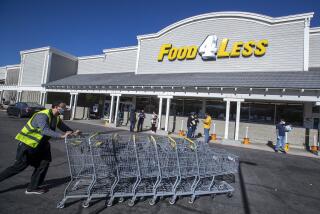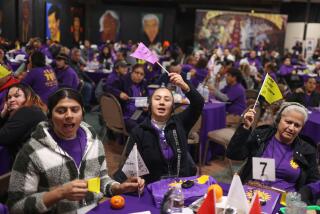A Special Report: Jobs : DOWNTOWN : After Grocery Class, There’s a Job in Store
- Share via
A year ago, Herminio Tobar was laid off from the warehouse supervisor job he held for 12 years when his employer moved out of state.
The sole provider for his wife and toddler, Tobar looked for another job with no success. After a six-month search, the 26-year-old resident of the Koreatown area heard about a new job-training program that prepares the unemployed to work in grocery stores. He decided learning something new couldn’t hurt.
The Center for Employment Training’s retail grocery course paid off. Last week, Tobar was hired as a cashier trainee at Superior Warehouse Grocers in Florence, becoming the first graduate of the six-month program to get a job.
Meanwhile, a few other trainees are interviewing with independent and chain grocery stores, while 250 people are on a waiting list to take the course.
The grocery course is “a phenomenal success,” said Manuel Cons, regional director of the Center for Employment Training, a 25-year-old nonprofit organization with 27 training facilities in California and three in Arizona and Nevada.
The grocery program was launched in January as a key feature of the Center for Employment Training’s new Downtown campus at 426 S. Spring St. It was created after the Mexican-American Grocers Assn. conducted a survey and found a lack of qualified applicants for many grocery positions, Cons said.
The survey found that of 100 applicants, typically six are hired, and after three months, only two remain on the job, Cons said.
Center administrators say the program is the nation’s most comprehensive retail food training course, teaching students how to work in the meat, service deli, hot bakery and grocery departments. The program also offers lessons in remedial English, math and other basic skills.
The program began with four students but quickly grew to 40; the center can now accommodate as many as 50 students. The students are in class seven hours a day, five days a week. Lessons range from safety, sanitation and cash register operation to theft prevention.
Students must punch in at 7:55 each morning, just as if they were employed, and the classroom simulates the supermarket environment with check stands and shelves stocked with merchandise.
Tobar said the course’s strict discipline and the rigors of the industry turned off some students, but he enjoyed the challenge.
“It’s a serious, fast-paced business,” Tobar said. “It takes a lot of customer service.”
Grocers and employers provided input for the classes, donated equipment and spoke to the students. The Mexican-American Grocers Assn. is a partner in the program, which is funded primarily by a $246,000 grant from the city.
Over the next three months, the graduates’ progress in terms of placement, wages, retention and advancement will be monitored, Cons said. He has also applied for $400,000 in county grants to offer grocery training at the Center’s 9-year-old Vernon facility, where courses in shipping and receiving, machine-tool operation and custodial services are taught.
Classes in custodial work, building maintenance and automated office skills are also offered at the Downtown campus.
Information: (213) 687-9350.
More to Read
Inside the business of entertainment
The Wide Shot brings you news, analysis and insights on everything from streaming wars to production — and what it all means for the future.
You may occasionally receive promotional content from the Los Angeles Times.










